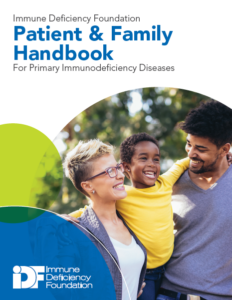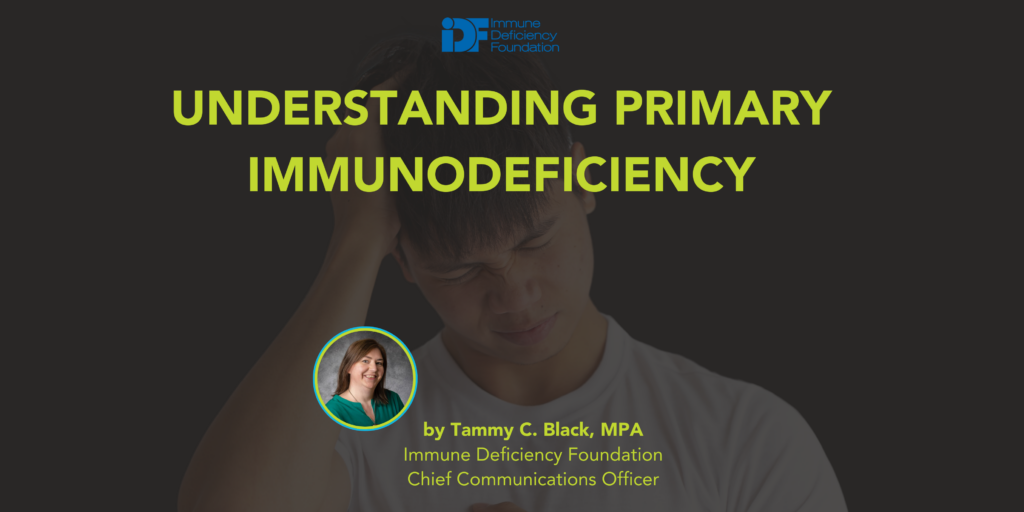The Immune Deficiency Foundation (IDF) has been a leading voice for individuals with primary immunodeficiency (PI) for more than four decades. Our mission is to improve the diagnosis, treatment, and quality of life of every person affected by primary immunodeficiency. We do that by fostering a community that is connected, engaged, and empowered through advocacy, education, and research.
While PI currently has no cure, there are lifesaving treatments available that can improve the quality of life for patients, including immunoglobulin therapies. To the infusion specialists reading this post, thank you for the work you do. You are saving lives every day.
What is PI?
Primary immunodeficiencies are a group of more than 550 rare, chronic conditions where a part of the body’s immune system is missing or does not function correctly. They are also known as inborn errors of immunity (IEI), and the many diagnoses have different symptoms, different treatments, and different names.
This creates a cycle of confusion and a dangerous combination: a disease that is invisible, rare, and chronic. If you have a PI, you may not look sick and people may not believe you when you tell them you’re sick. Often, nobody has heard of what you have, perhaps even your own medical provider. It is possible that you may never meet another person with your condition. And you will have this condition every day for the rest of your life. Having a PI can be very isolating.
It is estimated that 500,000 Americans have a PI (that number is approximately 10 million worldwide). It can take between nine and 15 years to receive a diagnosis of PI, and it’s estimated that 70-90% of those living with PI are undiagnosed.
PI conditions are caused by genetic variants and can affect anyone, regardless of age, gender, or ethnicity. Some PI disorders cause symptoms in infancy or early childhood, but others may not present until mid- or even late adulthood.
Diagnosing PI
Because these conditions prevent the immune system from working as it should, the body has a hard time protecting itself against infection. This increased susceptibility can lead to infections that are:
- Recurrent (keep coming back).
- Persistent (won’t completely clear up or clear very slowly).
- Unusual (caused by an uncommon organism).
- Severe (require hospitalization or intravenous antibiotics).
- Shared by family members (others in your family have or had a similar susceptibility to infection).
Infections can occur in any part of the body, such as the brain or spinal cord, ears, lungs, skin, sinuses, throat, and urinary or intestinal tracts. Additional symptoms include swollen spleen, liver or lymph nodes; inflammation of blood vessels; and autoimmune, or autoinflammatory symptoms. Because those with PI can have a variety of symptoms that are not specific to one organ, they tend to see multiple specialists while seeking a diagnosis.
IDF’s Medical Advisory Committee created resources for primary care and additional specialties (dermatology, ENT, gastroenterology, hematology/oncology, hepatology, infectious disease, pulmonology, and rheumatology) in the form of flyers that list symptoms and recommendations for testing.
So that patients can advocate for themselves to their medical providers, the Immune Deficiency Foundation recently created an immune system assessment tool that can detect patterns of symptoms and give individuals a mechanism to better understand their immune system. This tool generates a set of questions that can be taken to medical appointments to raise the index of suspicion for an immune system disorder.
Immune Deficiency Foundation Programs
Tens of thousands turn to IDF for trusted information and answers about their condition, for group and 1:1 support, and to be their advocate to ensure they have access to the treatment they need. Whether a person has been recently diagnosed, has been living with a primary immunodeficiency for years, or just thinks they might have a PI, IDF can help. While PI has no cure, there are lifesaving treatments available that can improve quality of life. Our programs are meant to connect, engage, and empower families to live longer, stronger, healthier lives.
Every day, people can turn to Ask IDF to help locate a physician, find information about diagnosis and treatment, and provide advice related to insurance, education, or employment. In– person and virtual education programs are offered on topics related to lifestyle management and various treatment modalities.

We know how important 
Each year, our community visits Capitol Hill for Advocacy Day, where we meet with elected officials to put a face on PI and advance legislation that improves access to treatment.
For clinicians, we offer a variety of programs, like the Consulting Immunologist program, where healthcare providers can connect for free with an immunologist specializing in PI to review questions about the diagnosis, treatment, or management of their patients with PI. Education programs are offered on topics related to diagnosis and treatment. Additionally, the outreach and education programs are available to clinicians throughout the year. 
More than $1.3 million in research funding has been distributed to more than 20 researchers since 2013 to study innovations in genetic sequencing, diagnostic innovations, and treatment modalities.
In addition to resources for families and clinicians, we also have a variety of resources available that can be useful to infusion specialists. The Immunoglobulin product booklet is a guide that is updated regularly with information on all immunoglobulin products approved by the U.S. Food and Drug Administration (FDA) for use in treating primary immunodeficiencies.
Because access to insurance coverage for immunoglobulin treatments is an issue for many in the PI community, IDF has template letters of medical necessity that individuals can have their healthcare provider submit on their behalf. For infusion nurses, IDF created a special booklet that provides direction for nurses who administer immunoglobulin replacement therapy.
World PI Week is April 22-29, so it’s a time for all of us to both raise awareness and give thanks. Our vision of a healthier day, every day, for every person with immune deficiency would not be possible without your expertise and dedication. The entirety of the PI community thanks you for that.
________________________________________________________________________
About The Author
Tammy C. Black, MPA is the Chief Communications Officer of the Immune Deficiency Foundation (IDF), a role she’s held since 2019. With more than two decades of experience in community outreach, media relations, public policy, and graphic design, Tammy leads strategic communications efforts for IDF with the goal of creating tools that both engage and empower a broad and diverse community affected by one of the more than 550 rare, chronic disorders known as primary immunodeficiency (PI).
Her passion for accessibility and inclusion was nurtured while at Gateway Maryland, a Baltimore-based organization specializing in accessible communication modalities for the D/deaf, hard of hearing, and autism communities. There, she launched the Baltimore Soundscape Project to national attention and was chosen as one of five recipients in the U.S. by Google to launch a live-captioning portal for new Google devices.
Earlier in her career, Tammy worked for The American Heart Association, The Center on Budget and Policy Priorities, and The American Cancer Society. She is a member of the American Society of Public Administration (ASPA), the Public Relations Society of America (PRSA), and the Nonprofit Technology Enterprise Network (NTEN). She serves on the Community Advisory Board of WYPR, Baltimore’s public radio station, and the World PI Week planning committee, composed of global participants to raise awareness for primary immunodeficiencies.
Tammy received her undergraduate degree from West Chester University in Political Science and an MPA from Nova Southeastern University, with a concentration in Nonprofit Management. An avid kayaker and ever-hopeful Orioles fan, Tammy and her husband, Doug, make their home in Baltimore, Maryland.
WeInfuse is dedicated to keeping infusion simplified by streamlining workflows for home infusion, specialty pharmacies, and infusion centers. WeInfuse software enables infusion operators to operate efficiently, decrease burnout, maximize profits, and improve clinical outcomes.
For more infusion insights, tune into the WeInfuse podcast, download our magazine, and subscribe to our blog.
See how WeInfuse is saving infusion operators both time and money with our ROI Calculators.





